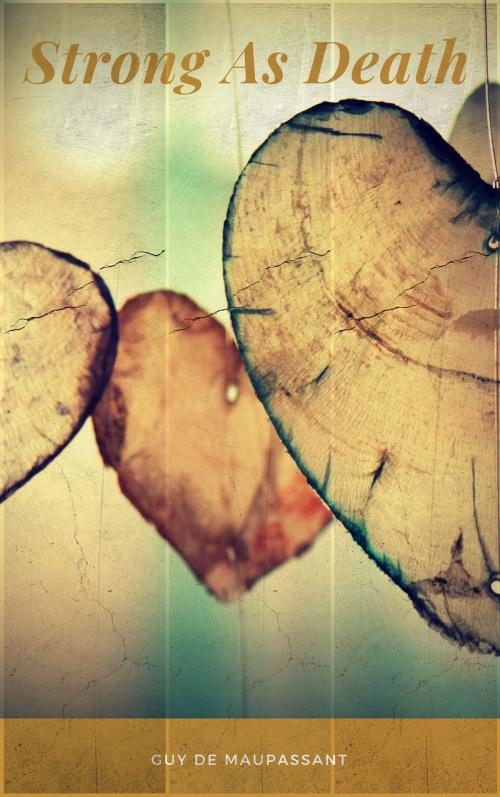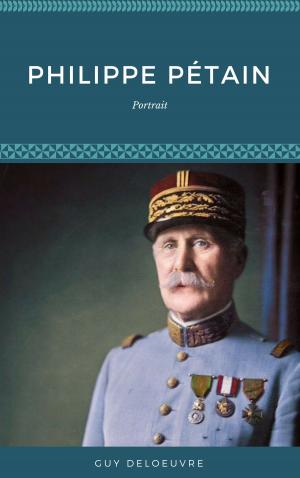| Author: | Guy de Maupassant | ISBN: | 1230003156063 |
| Publisher: | Guy Deloeuvre | Publication: | March 28, 2019 |
| Imprint: | Language: | English |
| Author: | Guy de Maupassant |
| ISBN: | 1230003156063 |
| Publisher: | Guy Deloeuvre |
| Publication: | March 28, 2019 |
| Imprint: | |
| Language: | English |
This novel has all the charm of Maupassant's novels. He analyses the world of high society, its rites, its pretences, its trivialities, its superficiality. He deals with many themes: old age, love, fame, the loss of a loved one, etc... and describes the characters' feelings perfectly.
The Countess' jealousy is treated magnificently in a passage that I cannot help but transcribe here:
"In her, on the contrary, the passionate attachment, the obstinate attachment of some women who give themselves to a man for all and for ever, is constantly growing.
But from the moment the Countess gave herself this way, she felt overwhelmed by fears about Olivier Bertin's constancy. Nothing held him but his will as a man, only a whim, only a passing taste for a woman he had met one day, as he had already met so many others! She felt him so free and easy to tempt, he who lived without duties, habits and scruples, like all men! He was a handsome boy, famous, sought after, having within reach of his desires all the women of the world whose modesty is so fragile, and all the women of the alcove or theater prodigal of their favours with people like him. One of them, one evening, after dinner, could follow him and please him, take him and keep him. She lived in the terror of losing him, spying on his gaits, his attitudes, overwhelmed by a word, full of anguish as soon as he admired another woman, praised the charm of a face, or the grace of a twist. Everything she didn't know about her life made her tremble, and everything she knew frightened her. At each of their meetings, she became ingenious at questioning him, without his noticing it, to make his opinions about the people he had seen, about the houses where he had dined, about the lightest impressions of his mind. As soon as she thought she could guess someone's possible influence, she fought it with a prodigious trick, with countless resources.
Oh, she often senses these short intrigues, without deep roots, that last eight or fifteen days, from time to time, in the existence of any prominent artist. She had, so to speak, an intuition of danger, even before she was warned of the awakening of a new desire in Olivier, by the festive air that the eyes and face of a man who is overexcited by a gallant fantasy.
Then she began to suffer, she was sleeping only with sleep disturbed by the torture of doubt. To surprise him, she arrived at his home without having warned him, threw questions that seemed naive, felt his heart, listened to his thoughts, as one feels, as one listens, to know the evil hidden in a being."
Rarely has a book moved me so much, rarely has a book made me cry so much. Maybe it was the connection I was able to make between Anne, her conception of love, a possessive, exclusive love and myself. I found myself in this woman. In short, this novel upset me, I recommend it to all lovers of the 19th century and the romantic literature characteristic of that period.
This novel has all the charm of Maupassant's novels. He analyses the world of high society, its rites, its pretences, its trivialities, its superficiality. He deals with many themes: old age, love, fame, the loss of a loved one, etc... and describes the characters' feelings perfectly.
The Countess' jealousy is treated magnificently in a passage that I cannot help but transcribe here:
"In her, on the contrary, the passionate attachment, the obstinate attachment of some women who give themselves to a man for all and for ever, is constantly growing.
But from the moment the Countess gave herself this way, she felt overwhelmed by fears about Olivier Bertin's constancy. Nothing held him but his will as a man, only a whim, only a passing taste for a woman he had met one day, as he had already met so many others! She felt him so free and easy to tempt, he who lived without duties, habits and scruples, like all men! He was a handsome boy, famous, sought after, having within reach of his desires all the women of the world whose modesty is so fragile, and all the women of the alcove or theater prodigal of their favours with people like him. One of them, one evening, after dinner, could follow him and please him, take him and keep him. She lived in the terror of losing him, spying on his gaits, his attitudes, overwhelmed by a word, full of anguish as soon as he admired another woman, praised the charm of a face, or the grace of a twist. Everything she didn't know about her life made her tremble, and everything she knew frightened her. At each of their meetings, she became ingenious at questioning him, without his noticing it, to make his opinions about the people he had seen, about the houses where he had dined, about the lightest impressions of his mind. As soon as she thought she could guess someone's possible influence, she fought it with a prodigious trick, with countless resources.
Oh, she often senses these short intrigues, without deep roots, that last eight or fifteen days, from time to time, in the existence of any prominent artist. She had, so to speak, an intuition of danger, even before she was warned of the awakening of a new desire in Olivier, by the festive air that the eyes and face of a man who is overexcited by a gallant fantasy.
Then she began to suffer, she was sleeping only with sleep disturbed by the torture of doubt. To surprise him, she arrived at his home without having warned him, threw questions that seemed naive, felt his heart, listened to his thoughts, as one feels, as one listens, to know the evil hidden in a being."
Rarely has a book moved me so much, rarely has a book made me cry so much. Maybe it was the connection I was able to make between Anne, her conception of love, a possessive, exclusive love and myself. I found myself in this woman. In short, this novel upset me, I recommend it to all lovers of the 19th century and the romantic literature characteristic of that period.















